
Lit Hub's Most Anticipated Books of 2020
A Look Ahead at the Year in Reading
MAY
 Anna Solomon, The Book of V.
Anna Solomon, The Book of V.
Henry Holt, May 5
Anna Solomon’s novel follows three women across three centuries—Lily, a mother and wife (and writer—sometimes) in 2016 Brooklyn coping with what her life could or should have been; Vivian Barr, a perfect political wife dedicated to her husband’s success above her own self-respect; and Ester, a young woman in ancient Persia who becomes a sacrifice to the King in order to save her family. What does it mean to be a woman, across centuries? What does a woman owe her family versus what does she deserve for herself? –Emily Firetog, Lit Hub Deputy Editor
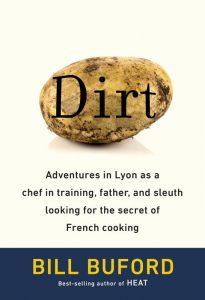 Bill Buford, Dirt
Bill Buford, Dirt
Knopf, May 5
Bill Buford has made a brilliant second career out of getting talented chefs to teach him to cook. Dirt begins at the beginning of this brilliant idea, when Buford and his wife, newly married and flush in love, quit their full-time magazine jobs and leave for Italy. But before long they have twins to think about, so Buford finagles a job learning French cuisine from Michel Richard and his crew at Citranelle, the year Richard won chef of the year (the Obamas celebrated their first date night there). What follows is a warm and funny and very delicious story about a man late in life falling in love with cooking. Buford’s always been an energetic, exquisite writer, but here there’s less Tom Wolfe in his prose and a lot more first-rate food writing. Once he arrives in Lyon for the serious instruction Dirt has really hit its stride, tasty and Dickensian in its characterizations and also ridiculous. Buford bumbles and humbles his way through some truly outstanding meals. In Heat, his 2006 memoir of learning from Mario Batali, there was quite a bit more about chef personality and vanity, big egos to go with big flavors. Most of that is gone here and what remains is sweet indeed. –John Freeman, Lit Hub Executive Editor
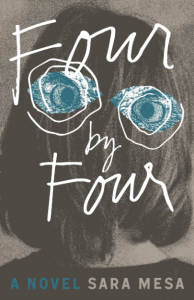 Sara Mesa, tr. Katie Whittemore, Four by Four
Sara Mesa, tr. Katie Whittemore, Four by Four
Open Letter, May 5
Gothic fiction continues to be interesting to writers not only for its obvious promise of thrills by way of haunted, impenetrable places and secrets, but for its rich narrative tradition that allows for experimentation with first-person narratives and deep psychological portraits. Sara Mesa’s gothic novel Four by Four takes place at Wybrany College, a type of stow-away school for rich kids, whose parents seek to protect them from the chaos of the cities. Gossip and tension are always lurking on the surface of the interactions at Wybrany, while “special,” scholarship students are disappearing. The first half of the novel establishes that something is very wrong, while the second half—in the form of diary entries of an imposter who has infiltrated the school—reveals why it is so. I am looking forward to see how Mesa has adapted the timeless themes of the gothic (e.g., isolationism, monstrosity, latent, toxic social structures) to a contemporary viewpoint and language. –Eleni Theodoropoulos, Lit Hub Editorial Fellow

Joe Sacco, Paying the Land
Metropolitan, May 5
The Economist called Joe Sacco the “heir to R. Crumb and Art Spiegelman,” and though his work is probably more in tune with the latter, Sacco is a talent entirely unto himself, applying an exquisitely fine eye for detail to the urgent histories that define the world around us, from Palestine to Bosnia. Now, Sacco brings that eye to the Mackenzie River Valley of the Canadian subarctic, specifically, to the lives of the Dene people, who’ve been in the area for centuries, and have likewise suffered generations of oppression and injustice in the wake of settler-colonial empire, which continues in the form of late-capitalist carbon extraction. Sacco, of course, has gone to see for himself the impact of the mining boom, and the long traumatic fallout of Canada’s “residential schools,” talking to elders and activists, trappers and priests, to get the full picture as only he can. –Jonny Diamond, Lit Hub Editor in Chief
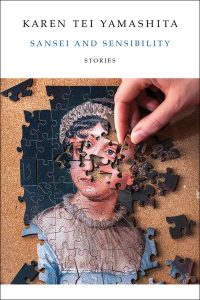 Karen Tei Yamashita, Sensei and Sensibility
Karen Tei Yamashita, Sensei and Sensibility
Coffee House, May 5
Karen Tei Yamashita is one of America’s great unsung geniuses. I, Hotel, a multi-character driven tale of housing in San Francisco and the people fighting for it, is a noisy modernist masterpiece that proves the novel really can accept everything you throw it—recipes, social commentary, crazy bento box construction—and not only hold up, but sing. In each one of her books Yamashita tries on a new construction technique. Here she’s mapped a series of stories onto the plots of Jane Austen novels, telling the tales of Japanese immigrants to the United States through the lens of their shared themes: inheritance, marriage, familial heritage. Entering her seventies, Yamashita is writing some of her finest stories yet. –John Freeman, Lit Hub Executive Editor
 Emma Straub, All Adults Here
Emma Straub, All Adults Here
Riverhead, May 5
Emma Straub is a master of the breezy, but still literary, family drama. Her fifth novel, in which a mother of three grown children experiences the emergence of a repressed memory that reframes her understanding of her kids’ childhood, promises to be another sprawling, big-hearted page-turner. –Jessie Gaynor, Social Media Editor
 Stephanie Danler, Stray
Stephanie Danler, Stray
Knopf, May 5
The first memoir from the author of Sweetbitter sounds quite dark: a childhood in a family of addicts, an inability to find happiness when publishing a bestseller, and a return to California after ten years, to find her mother depressed and handicapped after an aneurysm and her father addicted to crystal meth. And then there are those ten years—but there’s also light at the end of the tunnel. Danler is a deeply capable and captivating writer, and I’m sure this book will be a knockout. –Emily Temple, Lit Hub Senior Editor
 Ivy Pochoda, These Women
Ivy Pochoda, These Women
Ecco, May 5
In her last book, Wonder Valley, Pochoda presented her own distinct version of Los Angeles, populated by homeless people, middle-aged men in crisis, and a hippie commune in the desert. These Women looks like it also has indelible characters in a neighborhood in south LA who are all connected to the same man, and who are all in danger without knowing why. –Lisa Levy, CrimeReads Contributing Editor
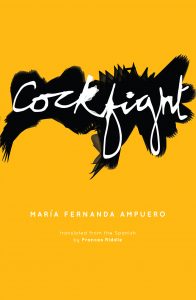 María Fernanda Ampuero, Cockfight
María Fernanda Ampuero, Cockfight
Feminist Press, May 5
María Fernanda Ampuero’s Cockfight, beautifully translated by Frances Riddle, is what happens when the line between love and violence wears thin. These thirteen stories paint a dark portrait of power and trauma, inflicted by hateful brothers, by criminal gangs. Cockfight is necessarily dark (brutal but not for the sake of being brutal), and it dares you to look away. You won’t be able to. –Katie Yee, Book Marks Assistant Editor
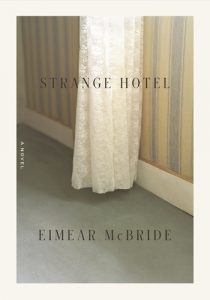 Eimear McBride, Strange Hotel
Eimear McBride, Strange Hotel
FSG, May 5
I’ve been looking forward to this novel ever since it was announced back in June. Considering it’s by McBride, the author of A Girl is a Half-Formed Thing, it’s sure to be a singular experience that no plot description will really illuminate, but the publisher calls it “the beguiling travelogue of a woman in exile: from her past, her ghosts, and herself,” which sounds pretty good to me. –Emily Temple, Lit Hub Senior Editor
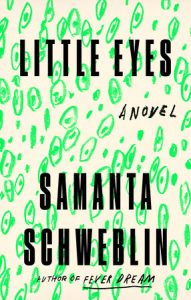 Samanta Schweblin, tr. Megan McDowell, Little Eyes
Samanta Schweblin, tr. Megan McDowell, Little Eyes
Riverhead, May 5
This brilliant and disturbing book resembles Margaret Atwood’s Handmaid’s Tale in how it speculates. The parts you think are made up are actually true. There are indeed wi-fi enabled robotic pets, animals who are cute and plugged in to the matrix, allowing people to talk across continents. But from this tiny detail Schweblin unspools a disquieting portrait of the dark sides of connectivity and the kinds of animalistic cyborgs it can make of us, as we walk through barriers that even spirits cannot cross. –John Freeman, Lit Hub Executive Editor
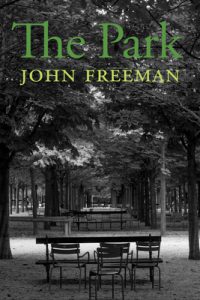 John Freeman, The Park
John Freeman, The Park
Copper Canyon, May 5
Our own John Freeman publishes his second collection of poetry in May—this one investigating and revolving around the city park (in particular the Luxembourg Gardens in Paris), its history and totems (“Almost all statuaries were killers;” one poem begins, “if on horseback, add ten thousand / to the toll.”), and all of the small (and global) human and animal dramas that play out within its limits. “A park’s purpose is to temper the machine in us,” Freeman writes. This is the perfect to take with you to your local park bench come spring, or whenever you need to recover a little humanity. –Emily Temple, Lit Hub Senior Editor
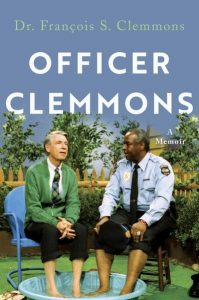 François Clemmons, Officer Clemmons: A Memoir
François Clemmons, Officer Clemmons: A Memoir
Catapult, May 5
François Clemmons played Officer Clemmons on Mister Rogers (making him the first African American with a recurring role on a children’s program) which would be reason enough for me to want to read his memoir. But Clemmons’ life beyond his work on the show, and his friendship with Fred Rogers (who, unfortunately, advised him to marry a woman rather than accept that he was gay) was fascinating, as well. And not for nothing, he’s also a Grammy Award-winning singer who has performed with operas across the country. –Jessie Gaynor, Social Media Editor
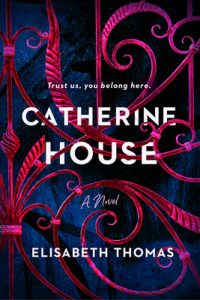 Elisabeth Thomas, Catherine House
Elisabeth Thomas, Catherine House
Custom House, May 12
I might be speaking for myself (even if the demand for this list says otherwise) when I say that campus novels, with their flair of the gothic and use of mystery, are a kind of guilty pleasure, and have come to claim a category of their own. Catherine House by Elizabeth Thomas takes place in a secluded liberal arts university that admits a select, elite group of students and promises the highest caliber of education and ensuing professional success if only: its students will spend three years there, renouncing every other connection they have to the outside world. The young protagonist Ines Murillo is initially thrilled to attend, but then comes to sense evil lurking behind the Draconian laws of the school. The debut novel has been likened to the works and atmosphere of Kazuo Ishiguro and Sarah Waters, and if the plot itself were not enough to lure me in, this certainly does not hurt. –Eleni Theodoropoulos, Lit Hub Editorial Fellow
 Emma Jane Unsworth, Grown Ups
Emma Jane Unsworth, Grown Ups
Gallery/Scout Press, May 12
Unsworth’s follow up to Animals is Grown Ups (which is being published as Adults in the UK, where it comes out in January) is being described as “Fleabag meets Conversations with Friends” and also “a neurotic dramedy of 21st-century manners for the digital age,” which are pretty much the same thing, the same thing being just what I want to read when I need to get away from the internet, and/or myself, and/or all my friends. –Emily Temple, Lit Hub Senior Editor
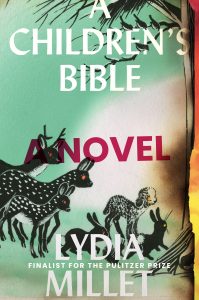 Lydia Millet, A Children’s Bible
Lydia Millet, A Children’s Bible
Norton, May 12
I loved Lydia Millet’s last collection of short stories, Fight No More, (along with her classic, Love in Infant Monkeys) and I honestly think she should be much more famous. If you think it’s hard to find original voices in contemporary fiction, you’re not really reading properly—Millet is one such voice: comic, erudite, humane. I look forward to fighting with my colleagues over her forthcoming novel, A Children’s Bible, an apocalyptic runaway tale that pits a group of children against the chaotic, broken-down world made for them by their parents. Sound familiar? –Jonny Diamond, Lit Hub Editor in Chief
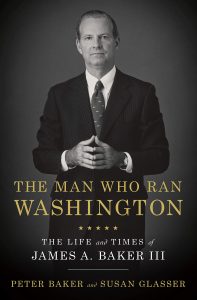 Peter Baker and Susan Glasser, The Man Who Ran Washington: A Life of James A. Baker
Peter Baker and Susan Glasser, The Man Who Ran Washington: A Life of James A. Baker
Doubleday, May 12
James A. Baker may forever go down as the political fixer called in to organize the Republican campaign to stop the recount in Florida during the 2000 election. But he had already had a long and highly wired career in Washington, running five (!) presidential campaigns prior to Bush vs. Gore. This deeply researched biography tells of his life, from Texas aristocracy to the tennis courts of a country club, where he met George Herbert Walker Bush, to a family tragedy that called him in to public service. In our time of outright party thugs and hacks, Baker’s career looks almost genteel, but he could be hard and play rough, as the recount made clear. While it’s inspiring to see how much he reached across the aisle and worked with Democrats, and negotiated with former adversaries as Secretary of State, somehow it’s not hard to come to the conclusion that his 2000 election performance made clear that win at all costs would become the way forward for his party. –John Freeman, Lit Hub Executive Editor
 Jenny Zhang, My Baby First Birthday
Jenny Zhang, My Baby First Birthday
Tin House, May 12
I first found Jenny Zhang through her debut short story collection, Sour Heart, which captures all these weird, beautiful, funny, and intimate angles of the first-generation Chinese-American immigrant experience. It’s a gift to look through her sharp and delightfully surprising lens again. In My Baby First Birthday, she returns to poetry to scratch at survival, innocence, nurturing, being a woman, and being alone. –Katie Yee, Book Marks Assistant Editor
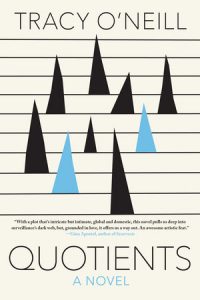 Tracy O’Neill, Quotients
Tracy O’Neill, Quotients
Soho, May 12
I’m a huge fan of Tracy O’Neill’s work, which always manages to be both cerebral and propulsive, tension-filled and deeply thoughtful. She’s a marvelous writer with sublime descriptive powers who also knows how to blend big ideas with intimate, nuanced characterizations. Her first novel, 2015’s The Hopeful, was the story of the psychological collapse of an injured figure skating prodigy. This year’s follow-up, which I am dying to read, is an epic saga about two people trying to leave behind their shadowy former professions and build a new life together “in a world of fractured identities and aliases, global finance, big data, intelligence bureaucracies, algorithmic logic, and terror.” –Dan Sheehan, Book Marks Editor
 Olivia Laing, Funny Weather: Art in an Emergency
Olivia Laing, Funny Weather: Art in an Emergency
Norton, May 12
Does Olivia Laing always seem to have a book coming out or is it just me? Toward the end of 2018 it was Crudo, her rapid-fire novel of one summer’s news cycles, and before that it was the marvelous The Lonely City, a memoir-cum meditation on what it means to exist in solitude surrounded by millions of people. Laing’s latest, Funny Weather: Art in an Emergency makes the case for art in a time of perpetual crisis, proffering it less as a solution to the endless tumult of manmade disaster but rather an antidote to the pervasive poisons of modern life. –Jonny Diamond, Lit Hub Editor in Chief
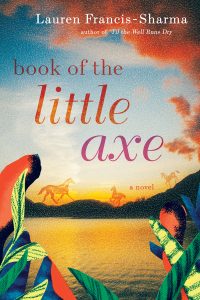 Lauren Francis-Sharma, Book of the Little Axe
Lauren Francis-Sharma, Book of the Little Axe
Grove, May 12
The protagonist of Book of the Little Axe is Rosa Rendón, a native of Trinidad who, ahead of her time in the year 1796, rebels against the antiquated divisions of labor of her hometown. Rather than dedicate her life’s efforts to cooking and keeping house, she is only passionate about running the family farm. However, the future she envisioned for herself is upended when her homeland switches from Spanish to British rule, a circumstance which endangers not only the assets of families of free black property owners like her own, but their very freedom. Decades later, Rosa is living in the Crow Nation of Bighorn, Montana, with her children and husband, and must relive the hardest moments of her life if she is going to help her son, Victor, become his own person. The novel’s prose and research has been praised for its adept and poignant historical narrative; it delves into the struggles of Native and African peoples at the time of colonial expansion. Book of the Little Axe seems like a necessary read at a time when power, identity, nationality are still used to oppress and divide. –Eleni Theodoropoulos, Lit Hub Editorial Fellow
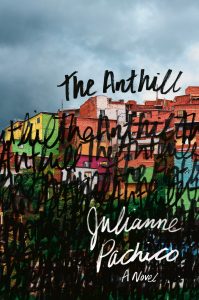 Julianne Pachico, The Anthill
Julianne Pachico, The Anthill
Doubleday, May 12
In The Anthill a homecoming becomes a haunting. Julianne Pachico’s protagonist, Lina, returns to her childhood home, Colombia, 20 years after being sent away to England. Upon her return, Lina looks for answers about her mother’s death. In an attempt to reconnect to her past and the land, she seeks out her childhood friend Matty who runs The Anthill—a daycare providing refuge for the street kids of Medellín. But Medellín and Matty seem to have changed, moving farther and farther away from the past, which Lina finds both disturbing and confusing amidst her quest for self-discovery. Strange things begin to happen at The Anthill, including ghostly sightings, with which Lina must reckon. Pachico has been praised by The New York Times Book Review for her “blunt, fresh, and unsentimental” writing, and the novel is said to be a hallucinatory ride in the company of The Vegetarian and Friday Black. As a fan of reading between the lines of a good-old literary ghost story, I am looking forward to this one. –Eleni Theodoropoulos, Lit Hub Editorial Fellow
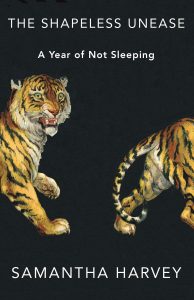 Samantha Harvey, The Shapeless Unease: A Year of Not Sleeping
Samantha Harvey, The Shapeless Unease: A Year of Not Sleeping
Grove, May 12
You’re not the only one not sleeping. For a year, the novelist Samantha Harvey was in her own extended fugue state of waking dreamlessness. This diary like book chronicles its unraveling effects on her, and finds a thin pure line in the small hours to think on the big issues that may be making it worse. In a time of circadian chaos, this book feels at once like a symptom and its balm. –John Freeman, Lit Hub Executive Editor
 Charlie Kaufman, Antkind
Charlie Kaufman, Antkind
Random House, May 12
Being John Malkovich and Adaptation are tied for my favorite movie, so I’m thrilled that Charlie Kaufman, who wrote both of those screenplays, has now also written a novel. Novels are like low-tech screenplays! Antkind is about a “neurotic and underappreciated film critic (failed academic, filmmaker, paramour, shoe salesman who sleeps in a sock drawer)” (sold) who finds unseen, and brilliant, film—”possibly the greatest movie ever made”—which is then destroyed. It sounds bonkers and hilarious and deeply human. It’s also apparently a “searing indictment of the modern world,” which I think is a pretty welcome sentiment right about now. –Jessie Gaynor, Social Media Editor
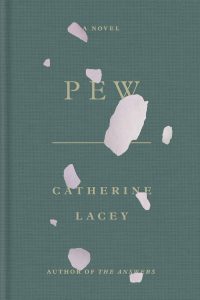 Catherine Lacey, Pew
Catherine Lacey, Pew
FSG, May 12
In the latest novel from the author of Nobody is Ever Missing and The Answers, an unidentified person—apparently genderless, raceless, and voiceless—appears on a pew in a small church whose congregation is busy preparing for something called the Forgiveness Festival. One of the members takes the person in, naming them “Pew.” But of course, when a person has no characteristics, the folks around may put whatever they want onto them—or simply grow to fear and despise them for being unknowable. –Emily Temple, Lit Hub Senior Editor
 Jim Newton, Man of Tomorrow
Jim Newton, Man of Tomorrow
Little, Brown, May 12
Jerry Brown has always been a fascinating politician, a little too regionally… weird (?) for the national stage, but somehow perfect for California, where his father served as governor in the 1960s. After serving as governor himself in the 1970s, Brown returned 28 years later to oversee something of a west coast renaissance, doubling down on a defense of both the climate and the right of immigrants (of all kinds) all while overseeing an economic boom. A longtime editor and writer for the Los Angeles Times, Jim Newton tells Brown’s story, finding in it the seeds of possibility for an America that is truly great. –Jonny Diamond, Lit Hub Editor in Chief
 Richard Ford, Sorry for Your Trouble
Richard Ford, Sorry for Your Trouble
Ecco, May 12
The latest short story collection from the decorated and prolific Ford takes us from Mississippi to Canada to New Orleans in the author’s usual lucid, moving prose. Another thing he is prolific at? Feuds. –Emily Temple, Lit Hub Senior Editor
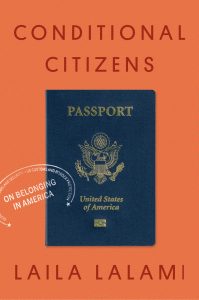 Laila Lalami, Conditional Citizens
Laila Lalami, Conditional Citizens
Pantheon, April 28
Laila Lalami’s previous books The Moor’s Account and The Other Americans brought a nuanced understanding to the ways that the myths of the American dream leave many of its residents, and in particular immigrants, by the wayside. Lalami has told Lit Hub that her work “is concerned with the transformation of identity, and how migration contributes to that transformation.” Now, with Conditional Citizens, Lalami brings this lens to a work of nonfiction that explores the reality of citizenship for those that are still disenfranchised by patriarchal, white supremacist institutions in the US, along with the power systems that work to maintain those institutions. –Corinne Segal, Lit Hub Senior Editor
 Karolina Waclawiak, Life Events
Karolina Waclawiak, Life Events
FSG, May 19
I’ve been a fan of Waclawiak’s work and her gimlet eye ever since I read her strange and delightful debut How to Get Into the Twin Palms, so I’m very much looking forward to her latest novel. In Life Events, a woman at a crossroads becomes an “exit guide,” taking on the task of helping terminally ill patients to make decisions about their own deaths—which inevitably leads to a series of strange encounters. Lydia Kiesling called it “a hypnotic novel that beautifully grapples with fundamental questions about how to die and how to live,” and that’s about all I’m interested in these days. –Emily Temple, Lit Hub Senior Editor
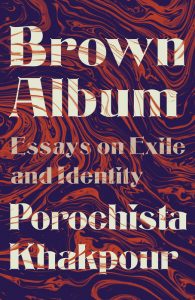 Porochista Khakpour, Brown Album
Porochista Khakpour, Brown Album
Vintage, May 19
The latest book from the author of Sick, The Last Illusion, and Sons and Other Flammable Objects collects essays about her experiences escaping the Iranian Revolution and winding up with her family in LA, growing up as an Iranian American, and living through 9/11—and the Trump presidency so far. There are essays from the last decade of Khakpour’s writing life here, as well as new work; she’s always a striking voice, and one we should heed. –Emily Temple, Lit Hub Senior Editor
 Suzanne Collins, The Ballad of Songbirds and Snakes
Suzanne Collins, The Ballad of Songbirds and Snakes
Scholastic, May 19
Do I really need to say more than “new novel set in the expanded Hunger Games universe”? Fine: The Ballad of Songbirds and Snakes takes place 64 years before the events of The Hunger Games trilogy, on the morning of the reaping for the tenth Hunger Games. That is all I know, and all I need to know. –Jessie Gaynor, Social Media Editor
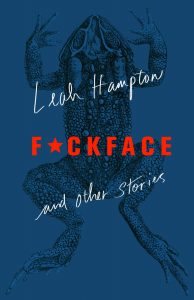 Leah Hampton, F*ckface
Leah Hampton, F*ckface
Henry Holt, May 19
Leah Hampton writes about “Appalachia, corpses, rurality, and smart women,” as says her bio, a fact which her debut collection F*ckface corroborates. F*ckface sure has grit—complemented by great compassion, wit, and ingenious connections between startlingly unrelated subjects. The title story features a queer young woman who comes to learn more about herself than she expected: it turns out she has more in common with the dead bear behind the store where she works than she ever would have thought. “Meat” is set during a funeral: “It was early autumn, that hushed, forthright season, and the chapel hummed with good, clean, true grief.” The protagonist Allison, a student of agriculture, is visiting her uncle, who takes it upon himself to tell the community about his niece’s undertakings. Hampton switches the narrative between the funeral (“The air in the church was dense with flesh.”) and Alison’s hellish, past internship in the slaughterhouse—both of which share an atmosphere of squalor that makes the reader squirm, while marveling at Hampton’s piercing prose. Leah Hampton really sees people. So this allows her, without any pretenses, to deliver a hell of a story. –Eleni Theodoropoulos, Lit Hub Editorial Fellow
 Barton Gellman, Dark Mirror: Edward Snowden and the American Surveillance State
Barton Gellman, Dark Mirror: Edward Snowden and the American Surveillance State
Penguin Press, May 19
Barton Gellman was one of the journalists to which Edward Snowden reached out as he leaked a cache of NSA documents, in the process becoming one of the most infamous whistleblowers in US history. In Dark Mirror, Gellman, who shared a Pulitzer with Glenn Greenwald and Laura Poitras for their reporting on Snowden, adds new details to the story of those documents, which instigated a major debate about surveillance, privacy, and government overreach in the US. The story also promises to offer a new perspective on the state of investigative journalism and more details about a complicated, fascinating reporter-source relationship. –Corinne Segal, Lit Hub Senior Editor
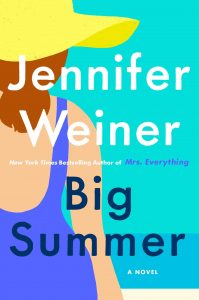 Jennifer Weiner, Big Summer
Jennifer Weiner, Big Summer
Simon & Schuster, May 19
Jennifer Weiner writes tremendously enjoyable books that hit me in the same pleasure center as romantic comedies do, so I’m very excited for her latest novel, set in the midst of a “lavish society wedding” on Cape Cod. Friendship, weddings, and rich people being weird? Obviously I am in. –Jessie Gaynor, Social Media Editor
 Ilana Masad, All My Mother’s Lovers
Ilana Masad, All My Mother’s Lovers
Dutton, May 26
Ilana Masad’s debut novel held my attention as early as its title, All My Mother’s Lovers, which renders a wit and promise of complication that makes for exciting reading. Maggie Krause, triggered by her mother’s death, returns home to find the remainder of her broken family and unveil the circumstances of her mother, Iris’s, death. Maggie, who carries the burden of a fraught mother-daughter relationship, follows the breadcrumbs of Iris’s will and sets off to deliver the five letters her mother addressed to unknown men. Maggie discovers that her mother had a secret life. In turn, she must deal with what her mother’s death has left behind, including her anger at Iris’s overt disapproval of her sexuality. The narrative unfolds over a funeral and shiva and will tackle identity from many angles: the familial, the sexual, the repressed, the hopeful. –Eleni Theodoropoulos, Lit Hub Editorial Fellow
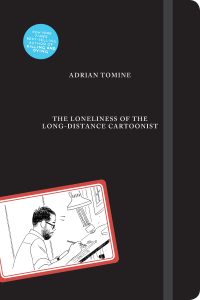 Adrian Tomine, The Loneliness of the Long-Distance Cartoonist
Adrian Tomine, The Loneliness of the Long-Distance Cartoonist
Drawn & Quarterly, May 26
Adrian Tomine’s latest is a kind of sketchbook and autobiography at once, or probably as close to it as he’ll ever come. It goes back to his childhood, when a medical illness laid him up and he discovered the pleasures of comics. From there grew a love and obsession and great talent. But Tomine’s always had a foot out the side comic world, something that has become clearer as his lusciously plain, moody panels have become mainstays of the New Yorker and elsewhere. This book, in its own way, will take you behind the scenes of that artistic coherence and equipoise to show the author himself tumbling into parenthood and midlife the way many of us do, by accident and in a state of bewilderment. –John Freeman, Lit Hub Executive Editor
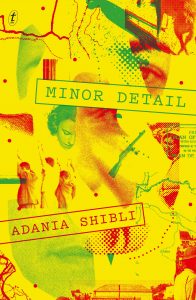 Adania Shibli, tr. Elisabeth Jaquette, Minor Detail
Adania Shibli, tr. Elisabeth Jaquette, Minor Detail
New Directions, May 26
In this shattering novel, Adania Shibli tells the tale of the brutal rape and murder of a Palestinian woman by Israeli soldiers in the Negev. They bury her in the sand and leave her behind. Decades later, Shibli’s unnamed narrator becomes fascinated with this crime and its victim, who was killed 25 years to the day before she was born. Moving between these two stories, Shibli has written a acutely disturbing novel, a book of violence and its aftermath, her prose as fine and chiseled as ever. –John Freeman, Lit Hub Executive Editor












